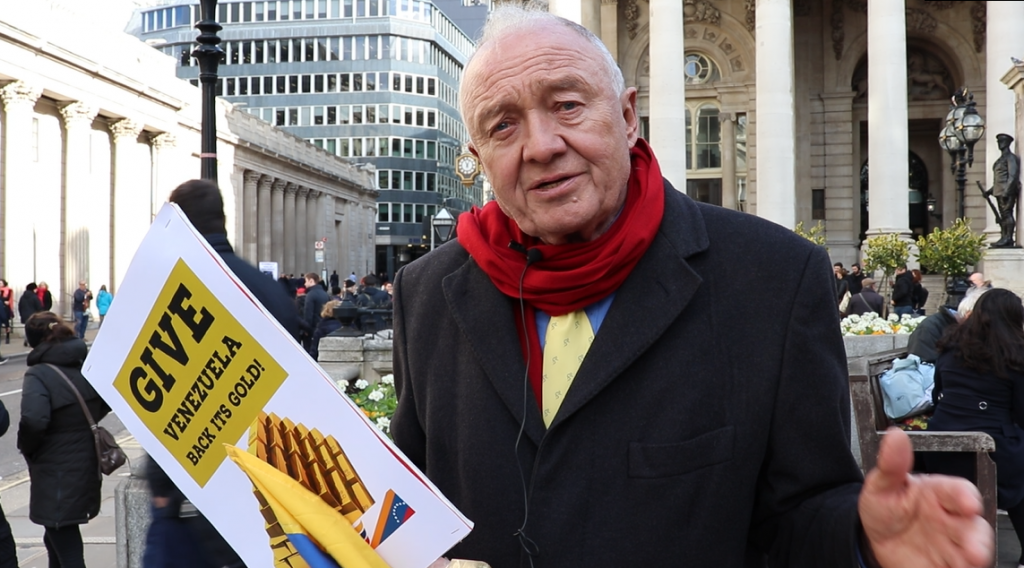The International Monetary Fund (IMF) is in effect putting political ideology above the welfare of the Venezuelan people, even in the face of real attempts at reconciliation between the nation’s political factions, by refusing emergency loans to the Latin American country, Ken Livingstone, former mayor of London and honorary president of the Venezuela Solidarity Campaign, told Sputnik on Tuesday.
Venezuela’s attempt to access some $5 billion was rebuffed by IMF officials on the grounds that there remained “no clarity” among its members on who constituted the legitimate presidential authority within Venezuela, a statement that alludes to Venezuela‘s ongoing political standoff between elected President Nicholas Maduro and opposition figure Juan Guido. Both the US and the EU recognized Guaido as interim president following his declaration, while fellow IMF members such as Turkey, Russia and China have voiced their support for the ongoing Maduro administration, a point of divergence that has only grown as Venezuela slid further into economic and social turmoil over both political divisions and US-imposed sanctions.
“The IMF not approving the request for resources is putting ideology above the welfare of an entire people. The US is undoubtedly behind this decision,” Livingstone said.
Following last January‘s power struggle in Venezuela, Washington intensified pressure on the country by imposing new sanctions. As of Tuesday, the US government is believed to be considering offering some form of sanctions relief if Venezuela agrees to form a transitional government made up of representations from both the current administration and various opposition factions. Given that the sanctions themselves have had a serious impact on Venezuela‘s ability to deal with emergencies such as COVID-19, Livingstone noted that a report by the Washington-based Center for Economic Policy estimated that the sanctions have inflicted more than 40,000 deaths from 2017-2018. food and medicine imports continue to be delayed, disrupted and canceled, he added.
“Inevitably, this is affecting Venezuela‘s capacity to deal with the Covid-19 pandemic but unlike Brazil, say, the government has taken swift action to contain its spread. Combating the virus will put an enormous ongoing strain on the country, so additional resources from the request to the IMF are still desirable,” he said.
The former mayor added that a number of members of the opposition, including National Assembly Speaker Luis Parra, recently urged Washington to lift the sanctions due to the coronavirus pandemic.
Following longstanding efforts to engage in dialogue with politicians of the right-wing opposition, which has yielded positive results, Maduro recently invited opposition leaders to discussions in the Apostolic Nuncio � the Vatican’s embassy in Caracas � in order to try to reach consensus over the nation’s response to COVID-19.
“These are constructive moves which put to shame the IMF‘s willingness to see more deaths in Venezuela, rather than take a humanitarian position and offend [us President] Donald Trump, who is busy putting corporate interests and his re-election chances above the health and lives of American citizens,” Livingstone stated.
In addition, the IMF‘s refusal to grant a loan request from Venezuela to help offset the impact of the coronavirus pandemic has sparked a ripple of protests inside and outside the Latin American country, with critics of the Fund having welcomed last week’s statements from EU foreign policy chief Josep Borrell supporting both Caracas and Tehran‘s requests for financial aid.
“Josep Borrell’s statement that the EU is going to support Venezuela‘s request for IMF financial assistance is clearly welcome. I say this not just because of his emphasis on the need to step up international cooperation and solidarity but because of his specific recognition that it is US sanctions that are placing Venezuela in a difficult situation by preventing it from selling its oil,” Livingstone said, adding that EU support signifies a potential divergence within the IMF‘s membership.
According to the ex-mayor, Borrell’s statement also effectively acknowledges that only just over a third of the IMF membership recognizes Juan Guaido, the failed coup leader and self-proclaimed president, while the United Nations continues to recognize Nicolas Maduro as the elected leader of the country. As a result, this statement poses a much-needed challenge to the position of both the IMF and “its ultimate paymaster, the United States,” Livingstone said.
Caracas had originally requested access to the IMF‘s Rapid Financing Instrument (RFI), set up in 2011 to assist low-income nations struggling to deal with emergencies, such as natural disasters and viral outbreaks, in mid-March after the IMF said that it was making $50 billion available to tackle COVID-19 through its “rapid-disbursing emergency financing facilities.” The country was seeking to obtain some $5 billion to strengthen the nation’s health care system in preparation for the spread of COVID-19 among Venezuela‘s population of over 30 million.

